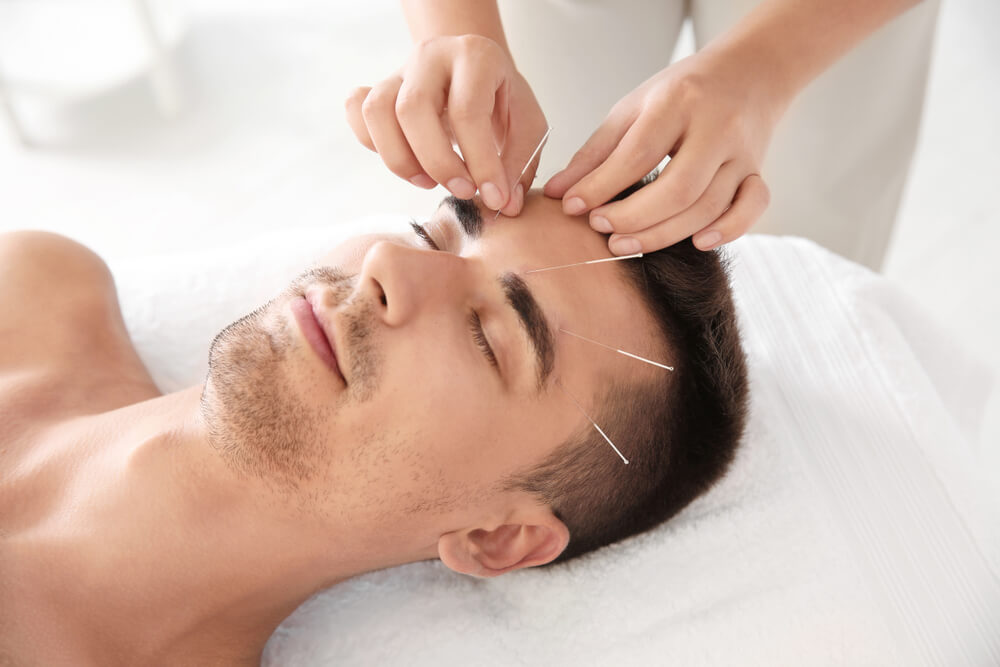
Acupuncture Benefits in Addiction Recovery
Legacy Healing Center Blog
Holistic Therapies: Benefits of Acupuncture in Addiction Treatment and Recovery
Acupuncture has become a popular and effective complementary treatment in addiction and recovery programs across the country. At Legacy Healing Center, acupuncture is one of the holistic modalities we use to help you heal from the inside out.
Click here to speak with a treatment specialist today or call us anytime 24/7 at (888) 534-2295
What is acupuncture?
Acupuncture originated in China and has been practiced for at least 2500 years. It is part of one of the oldest continually practiced systems of medicine in the world. It involves the gentle insertion of hair-thin, sterile, disposable needles into specific points on the body to bring about internal change. The theory of acupuncture is based on the idea that energy called Qi (pronounced “chee”) flows through the body along specific pathways called meridians. Disruptions in this energy flow are believed to cause disease and acupuncture needles are thought to access this energy, open its pathways and allow for the smooth flow of vitality throughout the entire system. Acupuncture is a holistic modality, meaning it simultaneously addresses the health of the whole person in body, mind and spirit.
Benefits of acupuncture
Both the National Institutes of Health (NIH) and the US Department of Veterans Affairs (VA) report that acupuncture shows promising results in the treatment of a wide variety of conditions including but not limited to:
- addiction,
- pain,
- nausea,
- vomiting,
- headache
- PTSD
- anxiety
- depression
- insomnia
Proponents of acupuncture also report an increased sense of calm and wellbeing. In addition, adverse effects from acupuncture are substantially lower than for many drugs or other accepted medical procedures for the same conditions.
How acupuncture complements recovery and addiction treatment
In the context of addiction treatment and recovery, acupuncture is of particular benefit. Acupuncture addresses many of the short-term symptoms associated with withdrawal and detoxification and can help to provide support and comfort during the process. Acupuncture also aims to help to resolve many of the deeper root causes of pain and suffering and can contribute to the long-term success of our participants.
How it works
From a western perspective, much still remains to be understood about how acupuncture works. Despite considerable efforts to understand key eastern medical concepts such as Qi, meridians, and the functions of specific acupuncture points, western science has not been able to clearly correlate these with our contemporary biomedical understanding of the human body.
However, many internal biological responses to acupuncture have been repeatedly observed and studied. These include:
- release of endogenous endorphins, the body’s own natural pain relieving chemicals
- activation of the hypothalamus and pituitary glands resulting in broad systemic effects
- alterations in the secretions of neurotransmitters and neurohormones
- changes in the regulation of blood flow both centrally and peripherally
- alterations in immune functions
These responses have been observed locally, ie at or near the site of needle insertion, as well as systemically throughout the body.
What to expect
Most people report that acupuncture is a very comfortable and relaxing experience.
Many of the most commonly used points are located on the lower arms and legs, the back and also the ears. Needles are shallowly inserted, usually 2-3mm under the surface of the skin. Once the needles are inserted they are typically retained for anywhere from 20-40 minutes while the patient is allowed to rest. One treatment commonly used in addiction and recovery settings is the NADA protocol (National Acupuncture Detox Association). This involves insertion of needles into five specific points on each ear.
The points included in the NADA protocol are:
- Liver
- facilitates detoxification of the body
- calms emotions of anger and frustration
- helps the recipient to feel a greater sense of hope
- Lung
- Aids in oxygenation and detoxification of the body
- Resolves emotions of grief and regret
- Allows for a sense of openness and inspiration
- Kidney
- Aids in detoxification and rejuvenation of the body
- Helps resolve emotions of fear and hyper-vigilance
- fosters a sense of renewal and strengthens willpower
- Sympathetic
- Stimulates the sympathetic nervous system, aka the “rest and digest” response
- calms its counterpart, the parasympathetic nervous system, aka the “fight or flight” response
- Shen Men
- Also known as “spirit gate”
- Calms the spiritual heart and mind
- Empowers the qualities of stability and centeredness
Call to learn more about our comprehensive holistic approach and how acupuncture and other therapies can help you or someone you love. We are proud to support you in your journey back to your own inherent ability to thrive!